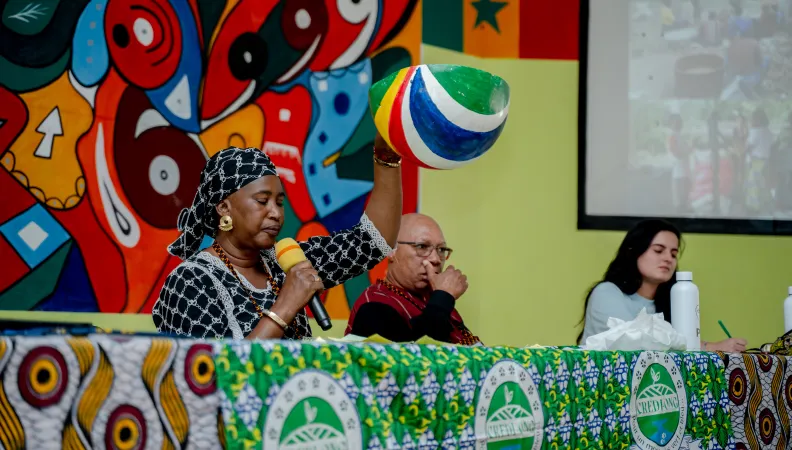Share the page
Women and Biodiversity: When Economic Inclusion Meets Forest Conservation in Cameroon
Published on

Since its creation, the French Global Environment Facility (FFEM) has been supporting projects that reconcile environmental protection with reducing inequalities, ensuring the inclusion of women in economic circuits and decision-making bodies. This approach guarantees, from the earliest stages, sustainable initiatives that can scale up for both sustainable and inclusive development. The FFEM thus contributes to international efforts for gender equality and women's empowerment worldwide, goals that are enshrined in the Beijing Declaration and Platform for Action, which we celebrate this year on its 30th anniversary.
On the occasion of International Women's Day, we highlight the actions of Tropical Forest and Rural Development (TF-RD), a Cameroonian association supported by the FFEM through the Small-Scale Initiatives Program supervised by the French Committee of the IUCN. TF-RD works across Cameroon to address the systemic exclusion of women from the formal economy. This initiative illustrates the potential links between biodiversity conservation and the economic inclusion of women, through the creation of value chains around non-timber forest products (NTFPs) and agroforestry.
It is in the vicinity of protected areas in Cameroon, such as the Dja Faunal Reserve and the Campo Ma'an National Park, that TF-RD works by supporting indigenous women's groups in the collection and transformation of NTFPs like moabi oil, shea butter, and njangsang. Through training in sustainable harvesting techniques and business management, these women develop natural cosmetic products meant to be marketed both nationally and internationally.
In collaboration with private partners such as Tropical Forest Food and Cosmetics, TF-RD helps these women’s groups market their products, while promoting local transformation processes to maximize community benefits. This approach enables women to generate stable income while preserving forest ecosystems, gradually leading them toward financial autonomy and security.
, explains Rose Francise Ngongwe, a njangsang producer.
The NGO has focused on securing the rights of access to natural resources in protected lands for both men and indigenous women through negotiations with local authorities and forest operators. TF-RD thus works to facilitate the signing of agreements that guarantee women the right to harvest NTFPs in certain concessions.
In the Baka community of Bifolone, women have played a central role in the transfer of land rights, enabling them to develop local value chains and invest in children's education, small businesses, and community resilience. Similarly, in the vicinity of the Dja Faunal Reserve, which hosts one of the largest and most biodiverse wetland forests in Africa, women are at the forefront of negotiations with logging companies, and their positions are represented with key partners such as the Ministry of Forests and Fauna, which grants rights for the use of NTFPs.
TF-RD's actions demonstrate how women's economic development can be aligned with improving community living conditions and biodiversity preservation efforts. By structuring and supporting initiative groups, the association promotes the autonomy and voice of these minorities. On this International Women’s Day, let us celebrate these change-makers who, through their commitment and know-how, are paving the way toward a more equitable and nature-respecting future.
